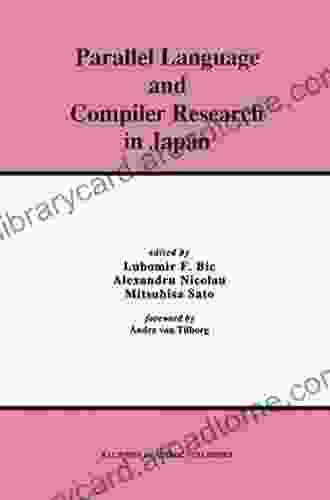Parallel Language and Compiler Research in Japan: A Comprehensive Guide

In the realm of computer science, Japan has emerged as a leading force in the research and development of parallel language and compiler technology. This article delves into the rich history, innovative approaches, and groundbreaking achievements of Japanese researchers in this field.
Historical Foundations
The origins of parallel language and compiler research in Japan can be traced back to the 1970s, when the Fifth Generation Computer Project was launched by the Japanese government. This ambitious project aimed to develop a new generation of computing systems capable of symbolic processing and parallel computation. Among its key objectives was the creation of parallel programming languages and compilers.
4 out of 5
| Language | : | English |
| File size | : | 62646 KB |
| Print length | : | 532 pages |
| Screen Reader | : | Supported |
Inspired by this vision, Japanese researchers began exploring various approaches to parallel language design and implementation. One notable contribution was the development of the super scalar programming language by Kazuhiro Furukawa and Ken ichi Yoda in 1985. This language introduced a novel data flow model that enabled efficient exploitation of parallel hardware.
Innovative Approaches
Japanese researchers have consistently pushed the boundaries of parallel language and compiler technology. One area of focus has been the development of domain-specific languages (DSLs) for parallel programming. DSLs are designed to target specific problem domains, providing a concise and expressive syntax tailored to the needs of those domains.
In this regard, Japan has made significant contributions to the development of DSLs for various fields, including scientific computing, data analytics, and image processing. Notable examples include the D language, which is widely used for high-performance computing, and the Numba library, which provides just-in-time compilation for numerical Python code.
Another area of innovation has been the development of advanced compiler optimizers. Compilers play a critical role in translating high-level programming languages into efficient machine code. Japanese researchers have developed sophisticated optimization techniques that can analyze and transform code to improve performance on parallel hardware.
One notable example is the SUIF compiler infrastructure, developed by the University of Tokyo. SUIF provides a framework for constructing optimizing compilers for various parallel architectures. It has been widely used in research and development of parallel programming systems.

Groundbreaking Achievements
The research efforts in Japan have led to a number of groundbreaking achievements in the field of parallel language and compiler technology. These achievements have had a profound impact on the development and use of high-performance computing systems:
- Development of the K computer: In 2011, Japan unveiled the K computer, which was the fastest supercomputer in the world at the time. The K computer was powered by a custom-designed processor and a parallel programming environment that leveraged the latest advances in parallel language and compiler technology.
- Contributions to the OpenMP standard: Japanese researchers have played a leading role in the development and standardization of OpenMP, a widely used parallel programming interface. OpenMP provides a portable and efficient way to write parallel programs for various shared-memory architectures.
- Advancements in auto-tuning: Auto-tuning techniques automatically tune compiler optimizations to match the characteristics of specific hardware and applications. Japanese researchers have developed sophisticated auto-tuning algorithms that can significantly improve performance on parallel systems.
Current and Future Directions
The research in parallel language and compiler technology in Japan continues to thrive. Current directions of research include:
- Exascale computing: As the world moves towards exascale computing, Japanese researchers are developing new parallel languages and compilers that can harness the power of massively parallel architectures.
- Heterogeneous computing: With the emergence of heterogeneous computing systems that combine different types of processors, researchers are exploring ways to efficiently support parallel programming on these architectures.
- Machine learning: The integration of machine learning techniques into parallel language and compiler technology has the potential to further enhance performance and productivity.
Parallel language and compiler research in Japan has played a pivotal role in the advancement of high-performance computing. The innovative approaches and groundbreaking achievements of Japanese researchers have made significant contributions to the development and use of parallel programming systems. As the field continues to evolve, we can expect Japan to remain at the forefront of research and innovation in this vital area.
4 out of 5
| Language | : | English |
| File size | : | 62646 KB |
| Print length | : | 532 pages |
| Screen Reader | : | Supported |
Do you want to contribute by writing guest posts on this blog?
Please contact us and send us a resume of previous articles that you have written.
 Book
Book Novel
Novel Page
Page Chapter
Chapter Text
Text Story
Story Genre
Genre Reader
Reader Library
Library Paperback
Paperback E-book
E-book Magazine
Magazine Newspaper
Newspaper Paragraph
Paragraph Sentence
Sentence Bookmark
Bookmark Shelf
Shelf Glossary
Glossary Bibliography
Bibliography Foreword
Foreword Preface
Preface Synopsis
Synopsis Annotation
Annotation Footnote
Footnote Manuscript
Manuscript Scroll
Scroll Codex
Codex Tome
Tome Bestseller
Bestseller Classics
Classics Library card
Library card Narrative
Narrative Biography
Biography Autobiography
Autobiography Memoir
Memoir Reference
Reference Encyclopedia
Encyclopedia Alexei Shirov
Alexei Shirov Benjamin Uchiyama
Benjamin Uchiyama Mike Rana
Mike Rana Alexandria Peary
Alexandria Peary Alison Cross
Alison Cross Alan Sepinwall
Alan Sepinwall Alan T Brown
Alan T Brown Amanda Haas
Amanda Haas Till Mostowlansky
Till Mostowlansky Alex Boten
Alex Boten Amanda Lamb
Amanda Lamb Alana Hitchell
Alana Hitchell Alex Brendan Raco
Alex Brendan Raco Everett Woods
Everett Woods Michael Fitzgerald
Michael Fitzgerald Ingrid Pirker Binder
Ingrid Pirker Binder Jonathan Chapman
Jonathan Chapman Wendy Laybourn
Wendy Laybourn Jake Lang
Jake Lang Alex Wolf
Alex Wolf
Light bulbAdvertise smarter! Our strategic ad space ensures maximum exposure. Reserve your spot today!

 Nathaniel PowellUnlock the Pinnacle of Surgical Excellence: Schwartz Principles of Surgery,...
Nathaniel PowellUnlock the Pinnacle of Surgical Excellence: Schwartz Principles of Surgery,...
 Forrest ReedPractical Foundations of Arm64 Linux Debugging: Disassembling, Reversing, and...
Forrest ReedPractical Foundations of Arm64 Linux Debugging: Disassembling, Reversing, and... Connor MitchellFollow ·6.3k
Connor MitchellFollow ·6.3k Billy PetersonFollow ·8.5k
Billy PetersonFollow ·8.5k Leo MitchellFollow ·16.5k
Leo MitchellFollow ·16.5k Griffin MitchellFollow ·16.3k
Griffin MitchellFollow ·16.3k Jerome BlairFollow ·12.5k
Jerome BlairFollow ·12.5k Joel MitchellFollow ·8.6k
Joel MitchellFollow ·8.6k Paulo CoelhoFollow ·2k
Paulo CoelhoFollow ·2k Seth HayesFollow ·12.3k
Seth HayesFollow ·12.3k

 Joshua Reed
Joshua ReedBelieving, Living, and Enjoying by the Word: Unlock the...
In a world filled with...

 Cason Cox
Cason CoxUnveil the Extraordinary World of "The Alexiad": A...
Delve into the Heart of Byzantine...

 Junot Díaz
Junot DíazUnveiling the Intricacies of Intellectual Property: Your...
In today's knowledge-driven economy,...

 Aleksandr Pushkin
Aleksandr PushkinThe Life of Louise Mathew Gregory: A Tapestry of Triumphs...
A Woman of Extraordinary Substance Louise...

 Leon Foster
Leon FosterHomemade Lotion For Beginners: Transform Your Skincare...
Step into the world of...

 Terence Nelson
Terence NelsonUnveiling the Secrets of Radio, Television, and Film: An...
: Embarking on a Journey into the...
4 out of 5
| Language | : | English |
| File size | : | 62646 KB |
| Print length | : | 532 pages |
| Screen Reader | : | Supported |








